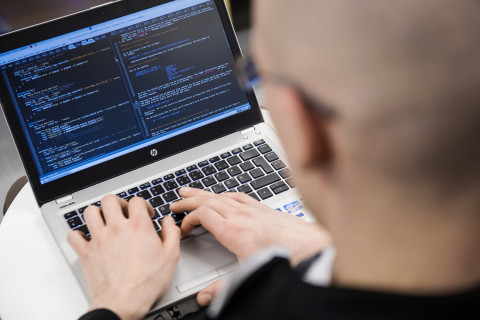A recent article published in Nature demonstrates that the evolution of leukemia is restricted by divergent signalling pathways. “We participated in this exciting study where the mutual exclusivity of oncogenic mutations in specific signalling pathways was shown based on the analysis of 1,148 patient-derived samples,” says Associate Professor Merja Heinäniemi who leads a bioinformatics-oriented research group at the Institute of Biomedicine, University of Eastern Finland.
The study was led by Markus Müschen, The Norman and Sadie Lee Foundation Professor in Pediatrics and the leader of the Systems Biology research group at the Beckman Research Institute of City of Hope, USA. The joined interest of the groups is to better understand the development of acute lymphoblastic leukemia (ALL).
Oncogenic mutations in B-cell acute lymphoblastic leukemia (B-ALL) frequently drive malignant cellular proliferation by mimicking signalling through cytokine receptors at the pro-B-cell or pre-B-cell stages. These oncogenic signalling pathways activate the transcription factor STAT5 and the protein kinase ERK, respectively. The study published in Nature showed that although mutations affecting these signalling pathways are found frequently, they occur together in only around 3% of cases. The researchers also showed that when one of these oncogenic pathways is activated, cells actively suppress the alternative pathway, whereas genetic reactivation of the divergent pathway reverses malignant transformation.
Based on the study, this convergence on one principal driver defines a central event in leukemia evolution. This mechanistic insight led the authors to test pharmacological reactivation of the suppressed pathway in combination with inhibition of the principal oncogenic driver. They found that this approach was an effective previously unrecognized strategy to enhance treatment responses.
Read more on the topic in City of Hope Breakthroughs Blog: Not all mutations lead to cancer, study finds
Large datasets shed light on leukemia
Heinäniemi visited the Comprehensive Cancer Center at City of Hope in 2017, at a time when the Department of Systems Biology had just moved to their new facilities. “I was very impressed by the composition of teams to whom Professor Müschen kindly introduced me. To my surprise, one group leader actually knew a lot about Finland, and it turned out her former laboratory technician came from Turku.”
Ongoing collaborations in childhood leukemia research have since lead to more visits. Researchers Petri Pölönen and Mari Lahnalampi from Heinäniemi’s group as well as Laura Oksa from collaborating Professor Olli Lohi’s group from Tampere University have visited Müschen’s group. All were PhD students at the time. “It is a valuable experience for young researchers to be engaged in collaborations and to experience different research environments. Most researchers working at the Beckman Research Institute are already post-doctoral fellows. I am therefore very grateful to Prof. Müschen for hosting these PhD students’ visits,” Heinäniemi says.
“Childhood leukemia is a heterogeneous disease with many sub-types, and in order to address new questions it is extremely valuable that large datasets are shared with the research community by international consortia,” adds Pölönen, who was one of the co-authors in the Nature article. Pölönen defended his PhD thesis earlier this year, and his thesis work included integration of multi-omics data sets across studies.
For further information, please contact:
Associate Professor Merja Heinäniemi, University of Eastern Finland, +358 40 355 3842, merja.heinaniemi (a) uef.fi
https://uefconnect.uef.fi/henkilo/merja.heinaniemi/
Research article:
Lai N. Chan, Mark A. Murakami, Mark E. Robinson, Rebecca Caeser, Teresa Sadras, Jaewoong Lee, Kadriye Nehir Cosgun, Kohei Kume, Vishal Khairnar, Gang Xiao, Mohamed A. Ahmed, Eamon Aghania, Gauri Deb, Christian Hurtz, Seyedmehdi Shojaee, Chao Hong, Petri Pölönen, Matthew A. Nix, Zhengshan Chen, Chun Wei Chen, Jianjun Chen, Andreas Vogt, Merja Heinäniemi, Olli Lohi, Arun P. Wiita, Shai Izraeli, Huimin Geng, David M. Weinstock & Markus Müschen. Signalling input from divergent pathways subverts B cell transformation. Nature 583, 845–851 (2020). https://doi.org/10.1038/s41586-020-2513-4


